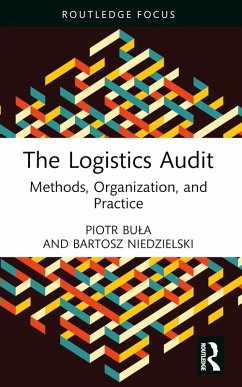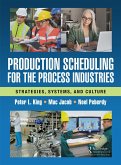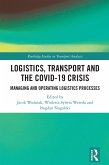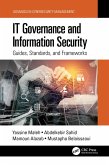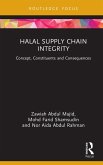20,95 €
20,95 €
inkl. MwSt.
Sofort per Download lieferbar

10 °P sammeln
20,95 €
Als Download kaufen

20,95 €
inkl. MwSt.
Sofort per Download lieferbar

10 °P sammeln
Jetzt verschenken
Alle Infos zum eBook verschenken
20,95 €
inkl. MwSt.
Sofort per Download lieferbar
Alle Infos zum eBook verschenken

10 °P sammeln
- Format: PDF
- Merkliste
- Auf die Merkliste
- Bewerten Bewerten
- Teilen
- Produkt teilen
- Produkterinnerung
- Produkterinnerung

Bitte loggen Sie sich zunächst in Ihr Kundenkonto ein oder registrieren Sie sich bei
bücher.de, um das eBook-Abo tolino select nutzen zu können.
Hier können Sie sich einloggen
Hier können Sie sich einloggen
Sie sind bereits eingeloggt. Klicken Sie auf 2. tolino select Abo, um fortzufahren.

Bitte loggen Sie sich zunächst in Ihr Kundenkonto ein oder registrieren Sie sich bei bücher.de, um das eBook-Abo tolino select nutzen zu können.
This book explores the development, methods and impact of logistics audits on organizations.
- Geräte: PC
- mit Kopierschutz
- eBook Hilfe
Andere Kunden interessierten sich auch für
![The Logistics Audit (eBook, ePUB) The Logistics Audit (eBook, ePUB)]() Piotr BulaThe Logistics Audit (eBook, ePUB)20,95 €
Piotr BulaThe Logistics Audit (eBook, ePUB)20,95 €![The Negotiation Handbook (eBook, PDF) The Negotiation Handbook (eBook, PDF)]() Andrea CordellThe Negotiation Handbook (eBook, PDF)39,95 €
Andrea CordellThe Negotiation Handbook (eBook, PDF)39,95 €![Managing Global Supply Chains (eBook, PDF) Managing Global Supply Chains (eBook, PDF)]() Ron BasuManaging Global Supply Chains (eBook, PDF)66,95 €
Ron BasuManaging Global Supply Chains (eBook, PDF)66,95 €![Production Scheduling for the Process Industries (eBook, PDF) Production Scheduling for the Process Industries (eBook, PDF)]() Peter L. KingProduction Scheduling for the Process Industries (eBook, PDF)57,95 €
Peter L. KingProduction Scheduling for the Process Industries (eBook, PDF)57,95 €![Logistics, Transport and the COVID-19 Crisis (eBook, PDF) Logistics, Transport and the COVID-19 Crisis (eBook, PDF)]() Logistics, Transport and the COVID-19 Crisis (eBook, PDF)41,95 €
Logistics, Transport and the COVID-19 Crisis (eBook, PDF)41,95 €![IT Governance and Information Security (eBook, PDF) IT Governance and Information Security (eBook, PDF)]() Yassine MalehIT Governance and Information Security (eBook, PDF)46,95 €
Yassine MalehIT Governance and Information Security (eBook, PDF)46,95 €![Halal Supply Chain Integrity (eBook, PDF) Halal Supply Chain Integrity (eBook, PDF)]() Zawiah Abdul MajidHalal Supply Chain Integrity (eBook, PDF)20,95 €
Zawiah Abdul MajidHalal Supply Chain Integrity (eBook, PDF)20,95 €-
-
-
This book explores the development, methods and impact of logistics audits on organizations.
Dieser Download kann aus rechtlichen Gründen nur mit Rechnungsadresse in A, B, BG, CY, CZ, D, DK, EW, E, FIN, F, GR, HR, H, IRL, I, LT, L, LR, M, NL, PL, P, R, S, SLO, SK ausgeliefert werden.
Produktdetails
- Produktdetails
- Verlag: Taylor & Francis eBooks
- Seitenzahl: 152
- Erscheinungstermin: 1. März 2023
- Englisch
- ISBN-13: 9781000880755
- Artikelnr.: 67462292
- Verlag: Taylor & Francis eBooks
- Seitenzahl: 152
- Erscheinungstermin: 1. März 2023
- Englisch
- ISBN-13: 9781000880755
- Artikelnr.: 67462292
- Herstellerkennzeichnung Die Herstellerinformationen sind derzeit nicht verfügbar.
Piotr Bula is an Associate Professor and Head of the International Management Department at Krakow University of Economics (KUE), Poland, Vice-Rector for Projects and Cooperation (KUE), former Director of Cracow School of Business (CUE), Senior Research Professor in Business Management Department at the University of Johannesburg, South Africa, and Grand Valley State University scholarship holder. He is the author or co-author of more than 175 publications in economics and management. His research interests focus on aspects related to the application of artificial intelligence and neuromanagement, risk management, internal audit, international management, and logistics. A member of international organizations associating professors and business practitioners in the management area: EFMD, CEEMAN, IMDA, GBATA, EIBA, GSSI, IAMB, EECSA, SAIMS.
Bartosz Niedzielski is an Assistant Professor at Krakow University of Economics, Poland. He studied and conducted scientific activities, among other subjects, at the University of Greenwich (UK), University of Oxford (UK), London School of Economics (UK), Deggendorf Institute of Technology (DE), and Jagiellonian University (PL). He has over ten years of professional experience gained in global corporations in the BPO/SCC sector (mainly at HSBC). His research interests focus on aspects related to the application of artificial intelligence in organizations, management, and internal audit. He is the author or co-author of more than 50 scientific publications in economics and management, including the monograph entitled Management, Organizations and Artificial Intelligence: Where Theory Meets Practice (Routledge, 2021).
Bartosz Niedzielski is an Assistant Professor at Krakow University of Economics, Poland. He studied and conducted scientific activities, among other subjects, at the University of Greenwich (UK), University of Oxford (UK), London School of Economics (UK), Deggendorf Institute of Technology (DE), and Jagiellonian University (PL). He has over ten years of professional experience gained in global corporations in the BPO/SCC sector (mainly at HSBC). His research interests focus on aspects related to the application of artificial intelligence in organizations, management, and internal audit. He is the author or co-author of more than 50 scientific publications in economics and management, including the monograph entitled Management, Organizations and Artificial Intelligence: Where Theory Meets Practice (Routledge, 2021).
Acknowledgments
Introduction
Chapter 1. Audit: a theoretical approach
1.1. Audit - definitions, types, objectives, mission
1.2. External audit vs. internal audit - similarities and differences
1.3. Evolution of internal audit against the background of audit generation
1.4. Internal audit and controlling - a comparative analysis
1.5. Internal auditor - role, tasks, standards, work
1.6. Control and analytical questions
Chapter 2. Logistics audit: a classical approach
2.1. The enterprise logistics system - definitions, types, treatments
2.2. Logistics audit, as an example of an industry audit
2.3. Logistic audit - organization, stages, procedures
2.4. Problem areas of the logistics audit
2.5. Logistics audit in the era of Industry 4.0
2.6. Control and analytical questions
Chapter 3. Logistics audit: a modular approach
3.1. Logistics audit of procurement
3.2. Logistics audit of production
3.3. The logistics audit of the warehouse
3.4. Logistics audit of distribution
3.5. Logistics audit of the supply chain
3.6. Control and analytical questions
Chapter 4. Logistics audit: a management approach
4.1. Audit - a tool for improving the organization
4.2. Logistics audit in the organization - analysis of the logistics system
potential
4.3. Logistics audit in the organization - identification of risks in
logistics processes
4.4. The impact of digitalization on the logistics audit
4.5. The current Polish and European market for logistics audit services
4.6. Control and analytical questions
Conclusion
Bibliography
Introduction
Chapter 1. Audit: a theoretical approach
1.1. Audit - definitions, types, objectives, mission
1.2. External audit vs. internal audit - similarities and differences
1.3. Evolution of internal audit against the background of audit generation
1.4. Internal audit and controlling - a comparative analysis
1.5. Internal auditor - role, tasks, standards, work
1.6. Control and analytical questions
Chapter 2. Logistics audit: a classical approach
2.1. The enterprise logistics system - definitions, types, treatments
2.2. Logistics audit, as an example of an industry audit
2.3. Logistic audit - organization, stages, procedures
2.4. Problem areas of the logistics audit
2.5. Logistics audit in the era of Industry 4.0
2.6. Control and analytical questions
Chapter 3. Logistics audit: a modular approach
3.1. Logistics audit of procurement
3.2. Logistics audit of production
3.3. The logistics audit of the warehouse
3.4. Logistics audit of distribution
3.5. Logistics audit of the supply chain
3.6. Control and analytical questions
Chapter 4. Logistics audit: a management approach
4.1. Audit - a tool for improving the organization
4.2. Logistics audit in the organization - analysis of the logistics system
potential
4.3. Logistics audit in the organization - identification of risks in
logistics processes
4.4. The impact of digitalization on the logistics audit
4.5. The current Polish and European market for logistics audit services
4.6. Control and analytical questions
Conclusion
Bibliography
Acknowledgments
Introduction
Chapter 1. Audit: a theoretical approach
1.1. Audit - definitions, types, objectives, mission
1.2. External audit vs. internal audit - similarities and differences
1.3. Evolution of internal audit against the background of audit generation
1.4. Internal audit and controlling - a comparative analysis
1.5. Internal auditor - role, tasks, standards, work
1.6. Control and analytical questions
Chapter 2. Logistics audit: a classical approach
2.1. The enterprise logistics system - definitions, types, treatments
2.2. Logistics audit, as an example of an industry audit
2.3. Logistic audit - organization, stages, procedures
2.4. Problem areas of the logistics audit
2.5. Logistics audit in the era of Industry 4.0
2.6. Control and analytical questions
Chapter 3. Logistics audit: a modular approach
3.1. Logistics audit of procurement
3.2. Logistics audit of production
3.3. The logistics audit of the warehouse
3.4. Logistics audit of distribution
3.5. Logistics audit of the supply chain
3.6. Control and analytical questions
Chapter 4. Logistics audit: a management approach
4.1. Audit - a tool for improving the organization
4.2. Logistics audit in the organization - analysis of the logistics system
potential
4.3. Logistics audit in the organization - identification of risks in
logistics processes
4.4. The impact of digitalization on the logistics audit
4.5. The current Polish and European market for logistics audit services
4.6. Control and analytical questions
Conclusion
Bibliography
Introduction
Chapter 1. Audit: a theoretical approach
1.1. Audit - definitions, types, objectives, mission
1.2. External audit vs. internal audit - similarities and differences
1.3. Evolution of internal audit against the background of audit generation
1.4. Internal audit and controlling - a comparative analysis
1.5. Internal auditor - role, tasks, standards, work
1.6. Control and analytical questions
Chapter 2. Logistics audit: a classical approach
2.1. The enterprise logistics system - definitions, types, treatments
2.2. Logistics audit, as an example of an industry audit
2.3. Logistic audit - organization, stages, procedures
2.4. Problem areas of the logistics audit
2.5. Logistics audit in the era of Industry 4.0
2.6. Control and analytical questions
Chapter 3. Logistics audit: a modular approach
3.1. Logistics audit of procurement
3.2. Logistics audit of production
3.3. The logistics audit of the warehouse
3.4. Logistics audit of distribution
3.5. Logistics audit of the supply chain
3.6. Control and analytical questions
Chapter 4. Logistics audit: a management approach
4.1. Audit - a tool for improving the organization
4.2. Logistics audit in the organization - analysis of the logistics system
potential
4.3. Logistics audit in the organization - identification of risks in
logistics processes
4.4. The impact of digitalization on the logistics audit
4.5. The current Polish and European market for logistics audit services
4.6. Control and analytical questions
Conclusion
Bibliography
